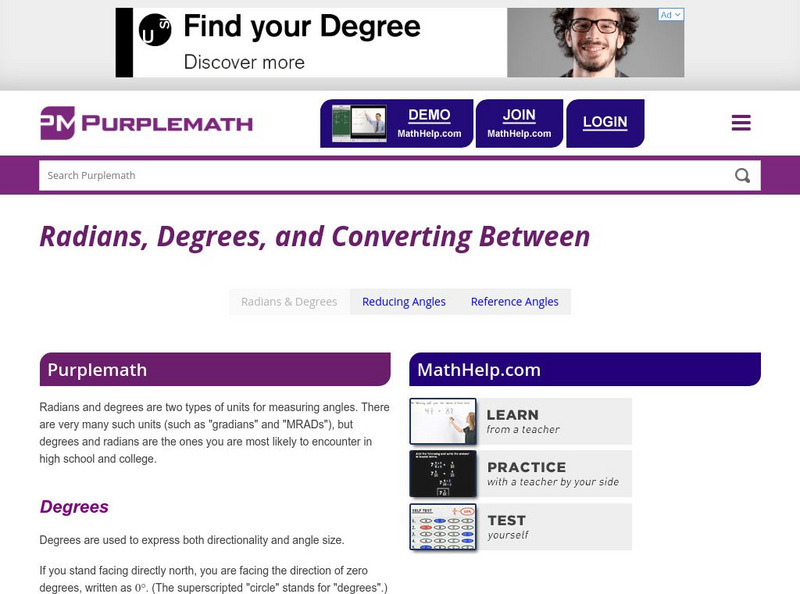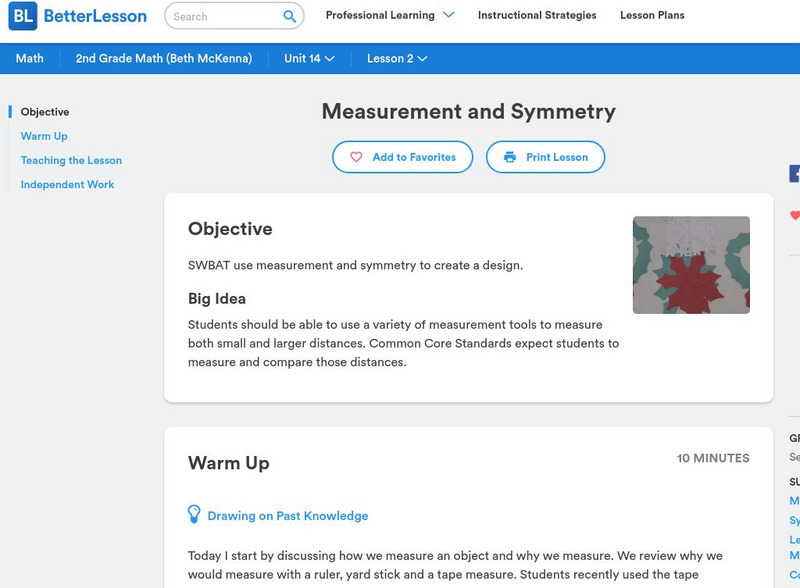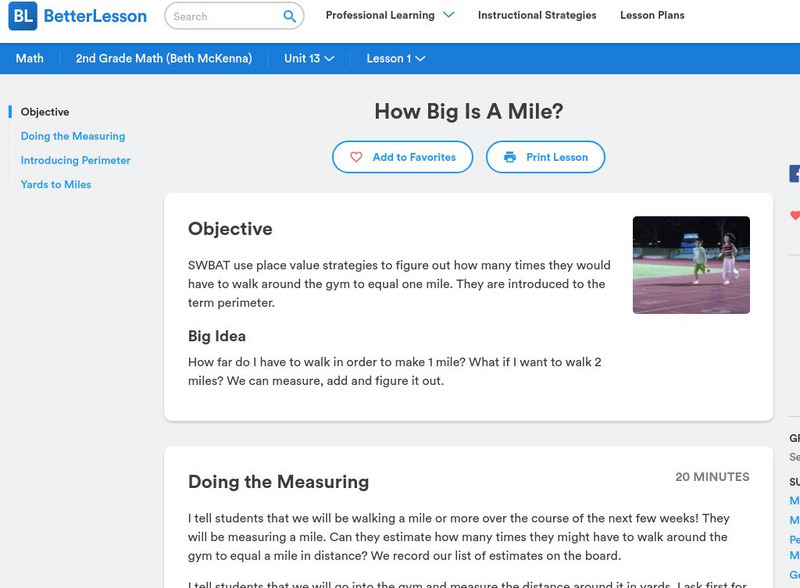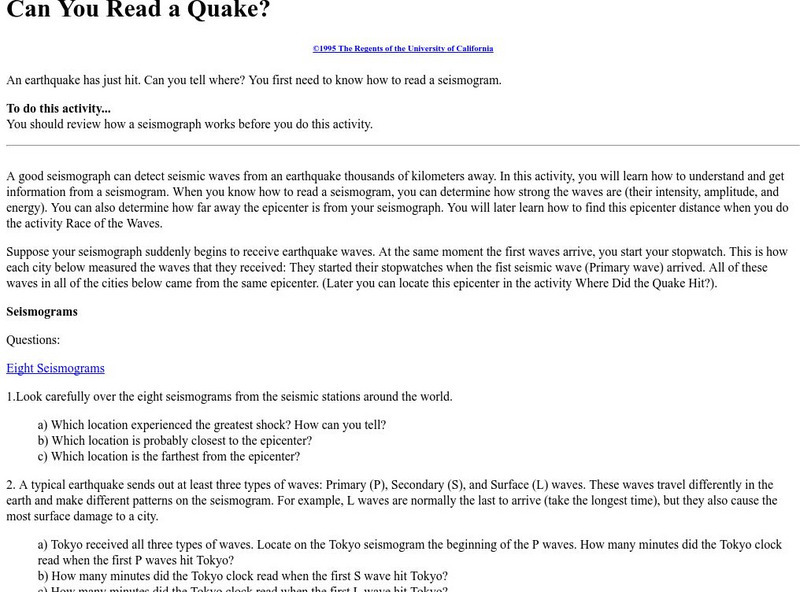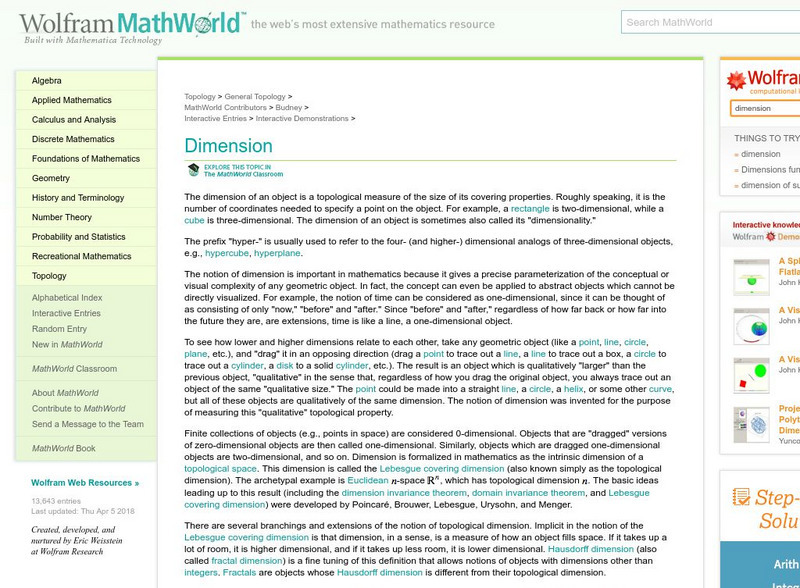Concord Consortium
Concord Consortium: Total Resistance for Resistors in Parallel
See how this application of Ohm's Law leads to a formula for the total of parallel resistances.
Purple Math
Purplemath: Conventions
A "convention" is "just the way a thing is done!". This reference material lists some common conventions (notational assumptions) for geometry and trigonometry.
Purple Math
Purplemath: Converting Between Radians and Degrees
Describes degrees and radians with respect to angles, the reason for the invention and use of radians, and how to convert between radians and degrees.
Better Lesson
Better Lesson: Fishy Tales
Students tell how long an object is by measuring it using paper clips and comparing it to other objects measured with the same non-standard unit of measurement.
Better Lesson
Better Lesson: Adding and Subtracting With Lengths
Second graders will use their addition and subtraction strategies to measure and compare distances, solving using centimeter units.
Better Lesson
Better Lesson: Attributes of 3 D Shapes Part 2
Second graders will identify the attributes of 3D shapes and measure the edges in inches and centimeters. This lesson contains a detailed plan and videos of students engaged in the activity.
Better Lesson
Better Lesson: Measurement and Symmetry
Second graders use a variety of measurement tools to measure both small and larger distances.
Better Lesson
Better Lesson: How Big Is a Mile?
How far do I have to walk in order to make 1 mile? Learners measure, add, and figure it out.
Better Lesson
Better Lesson: Measuring in Centimeters
They measure in Japan too. Students measure two objects and compare to decide how much larger one is than the other.
Better Lesson
Better Lesson: Estimate Lengths in Inches
Second graders will be able to estimate the lengths of objects by mentally partitioning the lengths into inches.
Better Lesson
Better Lesson: Shortest to Longest You Knew It, Now Glue It!
Kids need multiple experiences to practice what they've learned. This lesson is one in a series about measuring and ordering objects.
CK-12 Foundation
Ck 12: Algebra Ii: 4.4 Radians
This section introduces radians an alternative to degrees as a way to measure the rotation around a circle. It also begins to draw connections between radians and trigonometric identities.
CK-12 Foundation
Ck 12: Algebra Ii: 4.3 the Unit Circle
Activities in this lesson explore how to identify the coordinates where special right triangles intersect with the unit circle in all four quadrants, use both degrees and radians to identify angles, and explore angles of different sizes...
CK-12 Foundation
Ck 12: Interactive Geometry: 9.2 Pyramids and Cones
Take a look at some problems involving pyramids and cones.
CK-12 Foundation
Ck 12: Interactive Geometry: 8.9 Arc Length
Recall that a portion of a circle is called an arc. One way to measure an arc is with degrees.
Louisiana Department of Education
Louisiana Doe: Louisiana Believes: Eureka Math Parent Guide: Addition and Subtraction of Length Units
A guide to support parents as they work with their students addition and subtraction of length units.
Better Lesson
Better Lesson: Exploring Circumference
What is pi, anyway? Students explore the relationship between circumference and diameter by measuring a variety of circles and use it to derive the formula for circumference.
George Mason University
Area Formula Lab
In this set of worksheet activities, students will be guided to discover formulas for area of polygonal shapes and circles.
University of California
U. Of California Berkeley: Can You Read a Quake?
Eight seismograms and instructions are provided to assist in the learning of how to locate the epicenter of an earthquake.
Wolfram Research
Wolfram Math World: Dimension
This site from Mathworld.com provides information on what the dimension of an object means.
National Council of Teachers of Mathematics
The Math Forum: Volume
At this site from the Math Forum, Dr. Math explains the concept of volume using area as the base of information. The explanation includes some examples and is worth using for information on the subject.
Math Medics
S.o.s. Math: The Quartic Formula
This lesson provides information on the quartic formula. Examples are provided with answers.
Other
Music: Chords/tabs
This site offers the chord/tab instructions for playing a multitude of songs. The songs are listed on the first page. By clicking on the song, the chords will then be displayed in an easy-to-follow format.




